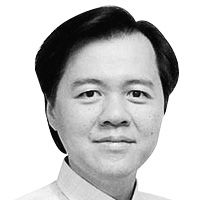Don’t forget these facts on dementia

Dementia is not a disease, but refers to a cluster of symptoms, which include memory loss, poor judgment, and impaired speaking ability. Elderly people with dementia are often confused and unable to remember people’s names. Their personalities may change, too.
When a doctor sees a patient with these symptoms, he/she will consider several possibilities. These are divided into irreversible and reversible causes. Let’s briefly run down each one.
Irreversible causes
The most common causes are Alzheimer’s disease and vascular dementia (mini-strokes). Both the upper and lower parts of the brain are damaged. Medicines may slow the progression of the disease, but cannot cure it.
• Alzheimer’s disease. This occurs in around 50% of all dementia cases. In Alzheimer’s disease, abnormal protein materials somehow get into the brain and affect the areas that control the intellect and memory. Giving medications may slow the progression of the disease.
• Vascular dementia. Found in 40% of patients, vascular dementia refers to the blockage of the brain’s arteries due to fats and other deposits. When the blockage involves the smaller arteries in the brain, this results in mini-strokes or “infarction.” Conditions like high blood pressure, high cholesterol, heart disease, and diabetes predispose the person to have vascular dementia. Treatment is geared towards these chronic conditions.
• Parkinson’s disease. Although not typically a cause of dementia, patients with Parkinson’s disease can develop dementia at the later stages of the disease. Initially, these patients have stiffened legs and arms, hand tremors, and speech difficulties.
• Lewy body dementia. This disease and its treatment are similar to Alzheimer’s disease.
• Huntington disease. This is an inherited disorder that causes movement problems and personality changes.
Reversible causes
These conditions may be treatable or partially treatable, especially when diagnosed early:
1) Head injury from accidents, such as motor vehicle accidents, falls, and boxing injuries.
2) Brain infections from meningitis, encephalitis, HIV-AIDS, and syphilis. These need to be treated early.
3) Brain tumors, which can be treated surgically or medically, especially when detected early by a CT scan or MRI scan.
4) Hydrocephalus or the accumulation of brain fluid inside the brain. The excess fluid compresses and destroys a part of the brain. A surgical procedure may be done to remove the excess fluid and reduce the pressure inside the brain.
5) Toxic exposure from heavy metal (such as lead) and solvents. Early diagnosis and avoidance of the toxic agent is the key to a successful outcome.
6) Liver failure and kidney failure, which can cause dementia due to the accumulation of waste substances in the body.
7) Illicit drug users may exhibit symptoms of dementia. They usually get better after the illegal drug is withdrawn.
8) Heavy alcoholics develop dementia because the alcohol penetrates the blood-brain barrier and destroys the brain cells. Alcoholics are typically deficient in nutrition, too. The treatment: Take a vitamin B complex tablet daily and stop drinking alcohol.
9) Rarely, some hormonal disorders, such as a malfunction of the thyroid gland or pituitary gland, can also lead to dementia.
Simple test
If someone is suspected of having dementia, doctors usually perform a mini-mental status examination (MMSE), also called Folstein test. This questionnaire is used to screen patients with some signs of mental decline.
Take note, however, that this questionnaire is just a preliminary guide and is not 100% accurate. Doctors will need a complete neurological exam, lab tests, and even a CT or MRI scan of the head to diagnose dementia. In addition, this questionnaire test is not sensitive if there are language barriers.
Mini-mental status exam
Ask the subject the following:
1) Orientation to time: What is the year, date, and month? (5 points)
2) Orientation to place: Where are we? What country, province or city, hospital, floor? (5 points)
3) Repeat the following words: apple, table, coin. You may give the instructions up to five times, but just score the subject after the first try. (3 points)
4) Calculation test: Count backwards by 7s starting from 100. Do this by subtracting 7 from 100, and so on. The correct answer is 100, 93, 86, 79, 72, 65… (5 points).
Note: Here’s an easier alternative question for English-speaking patients: Spell the word “world” backwards.
5) Test for recall: What were the three objects I just mentioned? Correct answer: Apple, table, coin. (3 points)
6) Test for language: What are these objects? Say this while pointing at a pencil and a watch. (2 points)
7) Repeat the following phrase: No ifs, and, or buts (1 point)
8) Three-step command: Take this piece of paper in your right hand, fold it in half, and put it on the floor. (3 points)
9) Read and obey: Show the subject an index card with the written words “Close your eyes.” (1 point)
10) Write a sentence. (1 point)
11) Copy the design. See figure shown. (1 point)

After the test, compute the subject’s total score. Out of a maximum score of 30 points, a score of 25 to 30 is normal. A score of 21 to 24 is mild, 10 to 20 is moderate, and 9 or less is severe. The scores may need to be adjusted for educational attainment.
To interpret the results, moderate and severe scores correlate with the possibility of dementia. Have the patient seen by a neurologist.



















